Search Result
Results for "
TH1
" in MedChemExpress (MCE) Product Catalog:
| Cat. No. |
Product Name |
Target |
Research Areas |
Chemical Structure |
-
- HY-108522
-
PA452
1 Publications Verification
|
RAR/RXR
|
Metabolic Disease
|
|
PA452, retinoic X receptor (RXR) specific antagonist, inhibits the effect of Retinoic acid (RA) on Th1/Th2 development [1].
|
-
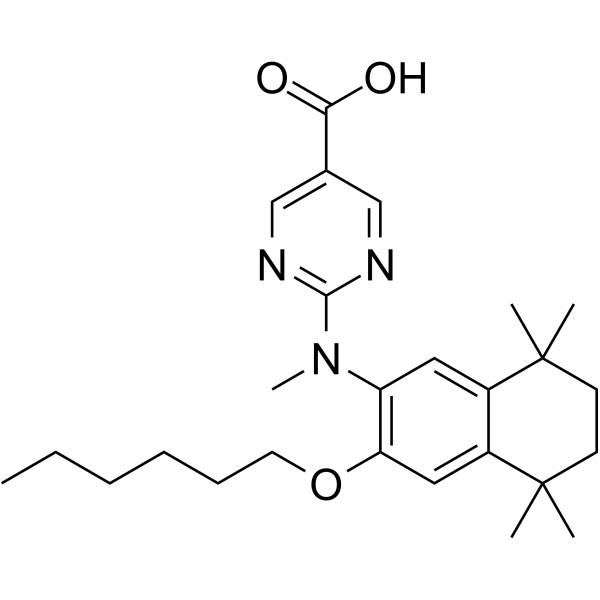
-
- HY-N2279
-
|
|
Others
|
Inflammation/Immunology
|
|
Kurarinone, a flavanoid derived from shrub Sophora flavescens, inhibits the process of experimental autoimmune encephalomyelitis via blocking Th1 and Th17 cell differentiation [1].
|
-
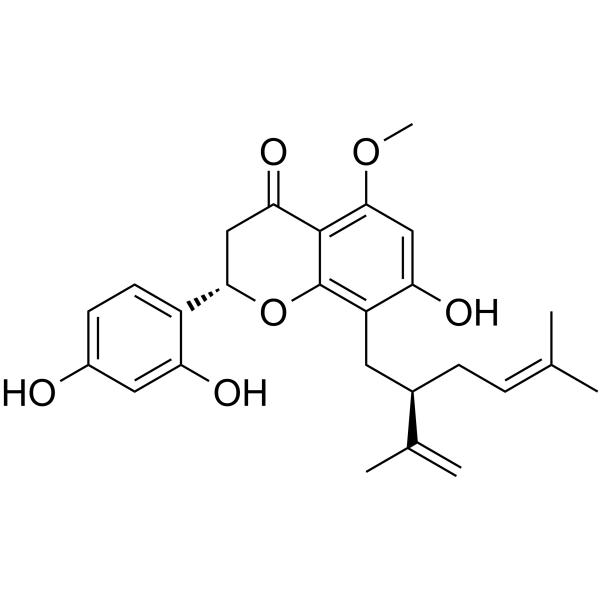
-
- HY-125390
-
|
CL-087
|
Toll-like Receptor (TLR)
|
Inflammation/Immunology
|
|
SM-360320 (CL-087) is a potent, orally active TLR7 agonist. SM-360320 is a immuno-modulator and exerts an antitumor effect. SM-360320 can act in synergy with DNA vaccines leading to an enhanced Th1 antibody response [1]. SM-360320 can inhibit HCV replication in hepatocytes via a type I IFN-independent mechanism in addition to its IFN-mediated activity .
|
-
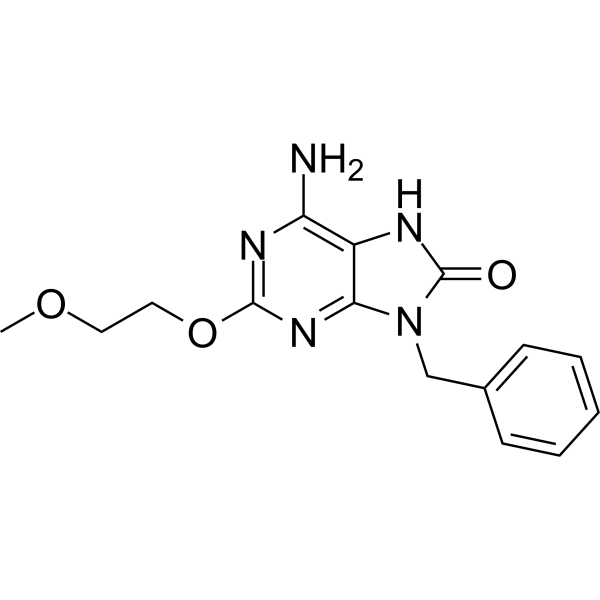
-
- HY-101871
-
-
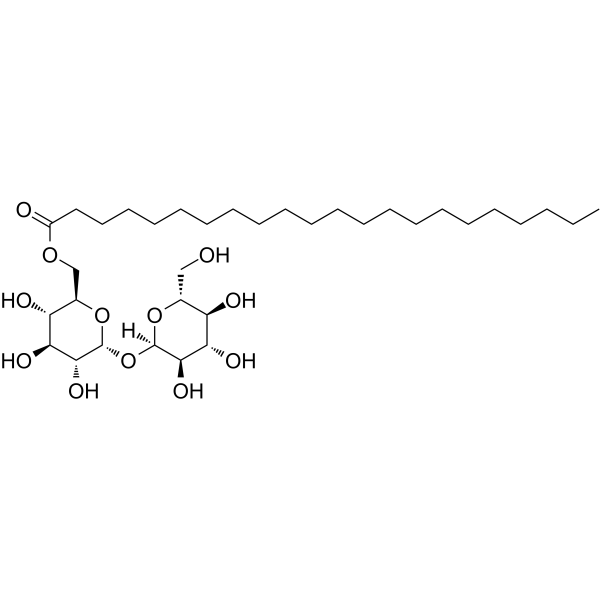
-
- HY-P1052
-
|
|
Others
|
Inflammation/Immunology
|
|
Myelin Basic Protein(87-99) is an encephalitogenic peptide that induces basic protein-specific T cell proliferation. Myelin Basic Protein(87-99) causes a Th1 polarization in peripheral blood mononuclear cells with is implicated of multiple sclerosis (MS) [1] .
|
-

-
- HY-16668
-
-
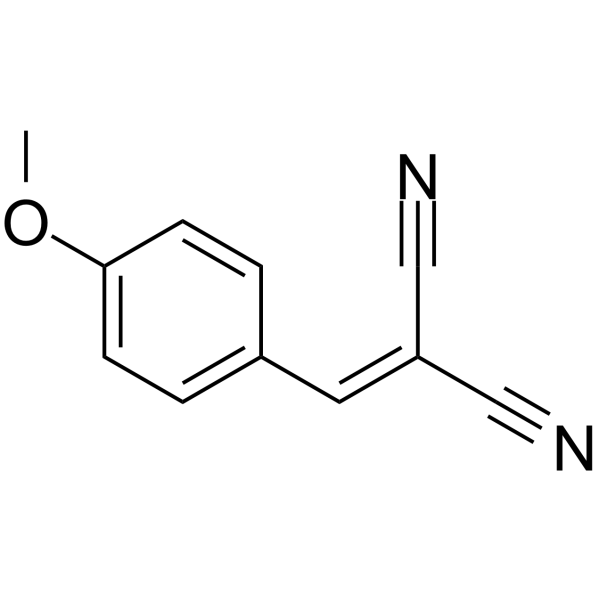
-
- HY-161255
-
|
|
NO Synthase
|
Inflammation/Immunology
|
|
3,4-DAA is an orally active Anthranilic acid derivative with potent immunosuppressive activities. 3, 4-DAA can alleviate the severity of colitis through inhibiting Th1 cells response, promoting Th2 cytokines expression and inducing CD4 +CD25 + T cells expression [1]. 3,4-DAA suppressed expression of inducible nitric oxide synthase (iNOS) and nitric oxide (NO) release from EOC20 cells induced by IFN-γ and Lipopolysaccharide .
|
-
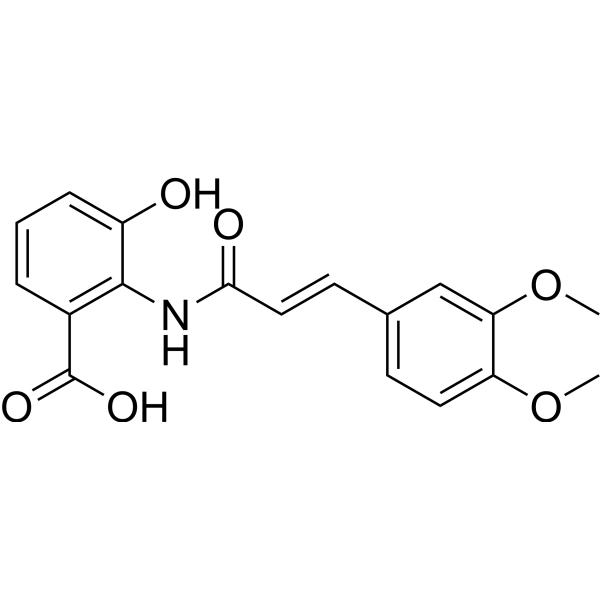
-
- HY-144200
-
|
|
CCR
|
Neurological Disease
Cancer
|
|
CCR8 antagonist 2 is a potent antagonist of CCR8. CCR8 (C-C Motif Chemokine Receptor 8) is predominantly expressed on Treg cells and Th2 cells, but not on Th1 cells. CCR8 antagonist 2 inhibits CCR8 activity, which may be used in the research of diseases mediated by CCR8, such as cancer, and/or neuropathic pain (extracted from patent WO2022000443A1, compound 220) [1].
|
-
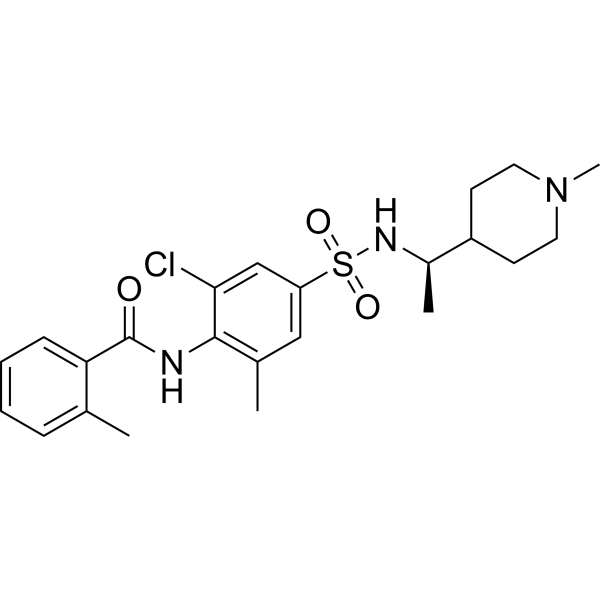
-
- HY-P99396
-
|
BI 655130
|
Interleukin Related
|
Inflammation/Immunology
|
|
Spesolimab (BI 655130) is an anti-IL-36R antibody. IL-36 involves in immune system, as Spesolimab can be used for palmoplantar pustulosis (PPP) research. Spesolimab is associated with the reduction of biomarkers linked to innate, Th1/Th17, and neutrophilic pathways [1] .
|
-
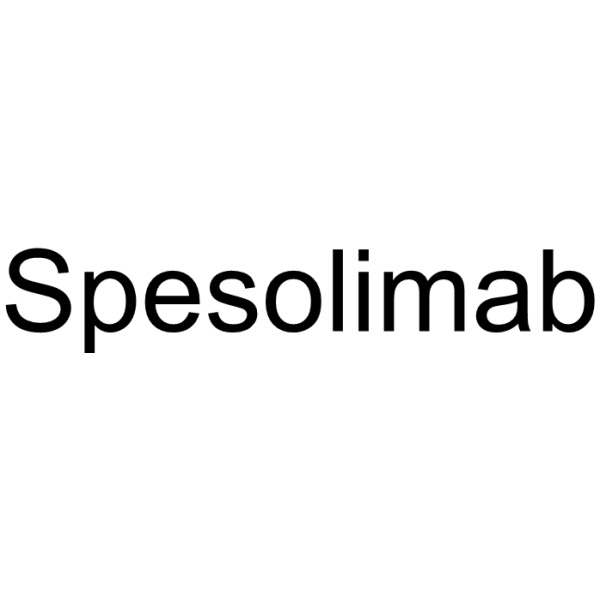
-
- HY-120225
-
|
|
p38 MAPK
|
Inflammation/Immunology
|
|
NJK14047 inhibits p38 MAPK and the differentation of naive T-cells to Th1 and Th17 cells. NJK14047 ameliorates the collage-induced rheumatoid arthritis and Imiquimod (HY-B0180)-induced psoriasis in mice [1].
|
-
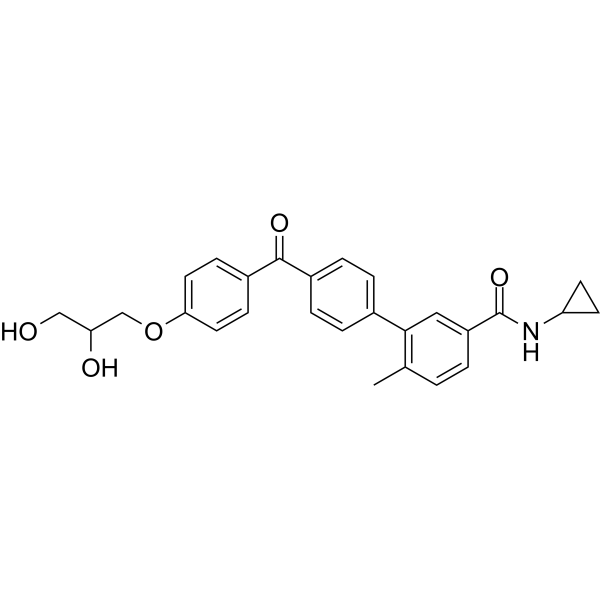
-
- HY-126037
-
|
|
ROR
|
Inflammation/Immunology
|
|
(±)-ML 209 (compound 4n), a diphenylpropanamide, is a retinoic acid-related orphan receptor RORγ antagonist with an IC50 of 1.1 μM. (±)-ML 209 inhibits RORγt transcriptional activity with an IC50 of 300 nM in HEK293t cells. (±)-ML 209 inhibits the transcriptional activity of RORγt, but not RORα in cells. (±)-ML 209 selectively inhibits murine Th17 cell differentiation without affecting the differentiation of naïve CD4 + T cells into other lineages, including Th1 and regulatory T cells [1].
|
-
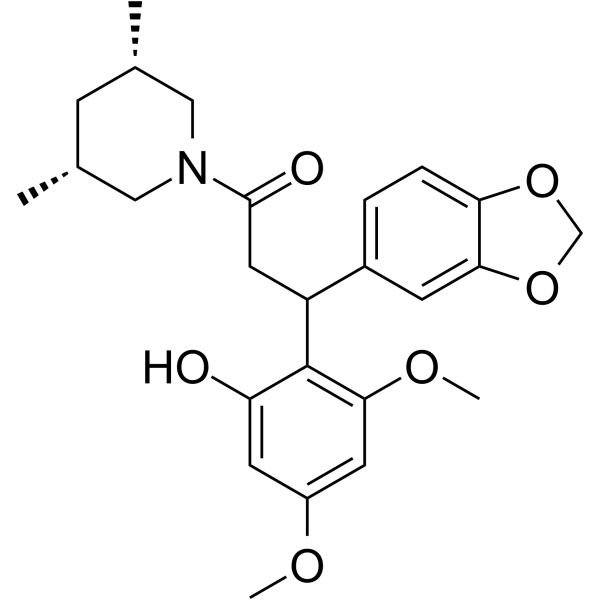
-
- HY-126360
-
|
|
TNF Receptor
Interleukin Related
|
Inflammation/Immunology
|
|
Oxazolone is a haptenizing agent that induces acute or chronic inflammation of the large intestine and is used to construct models of colitis. Oxazolone can cause Th1/Th2-dependent colitis with weight loss and diarrhea. Oxazolone-induced inflammation can be mitigated by neutralizing anti-IL-4 or anti-TNF-α antibodies or decoy IL-13R2-α-FC proteins [1].
|
-
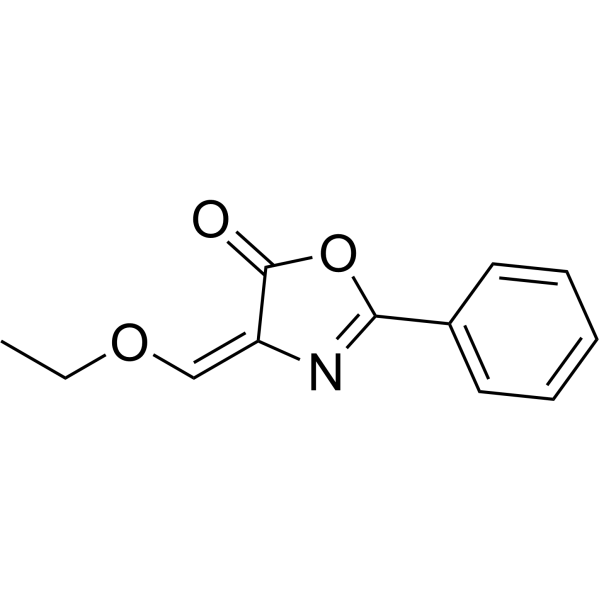
-
- HY-134771
-
|
AS1617612
|
STAT
|
Inflammation/Immunology
|
|
YM-341619 (AS1617612) is a potent and orally active STAT6 inhibitor with an IC50 of 0.70 nM. YM-341619 inhibits Th2 differentiation in mouse spleen T cells induced by IL-4 (IC50=0.28 nM) without affecting Th1 cell differentiation [1]. YM-341619 is a promising compound for the the research of allergic diseases, such as allergic asthma .
|
-
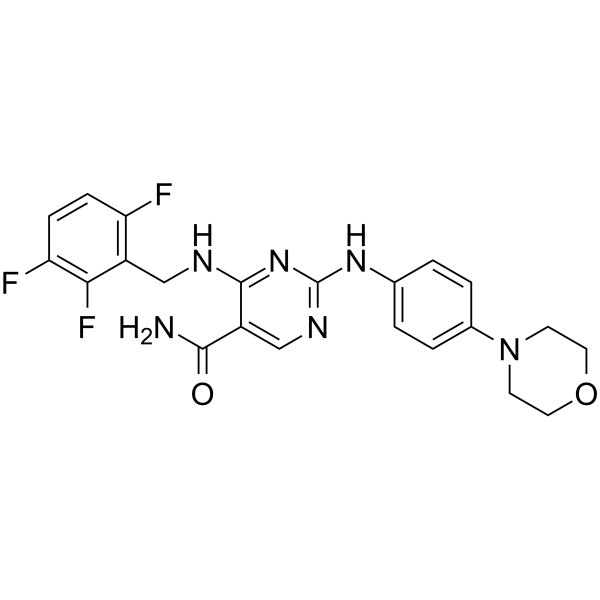
-
- HY-101092
-
|
Stimulon
|
|
|
|
QS-21, an immunostimulatory saponin, could be used as a potent vaccine adjuvant. QS-21 stimulates Th2 humoral and Th1 cell-mediated immune responses through action on antigen presenting cells (APCs) and T cells. QS-21 can activate the NLRP3 inflammasome with subsequent release of caspase-1 dependent cytokines, IL-1β and IL-18 [1] .
|
-
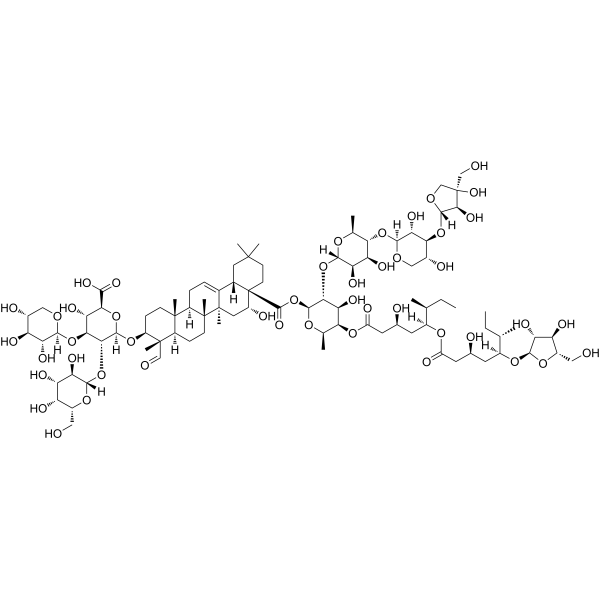
-
- HY-136065
-
|
|
PTEN
Phosphatase
Parasite
Apoptosis
|
Infection
Metabolic Disease
Inflammation/Immunology
Cancer
|
|
bpV(phen), a insulin-mimetic agent, is a potent protein tyrosine phosphatase (PTP) and PTEN inhibitor with IC50s of 38 nM, 343 nM and 920 nM for PTEN, PTP-β and PTP-1B, respectively. bpV(phen) inhibits proliferation of the protozoan parasite Leishmania in vitro. bpV(phen) strongly induces the secretion of a large number of chemokines and pro-inflammatory cytokines, and it activates a Th1-type pathway (IL-12, IFNγ). bpV(phen) can also induce cell apoptosis, and has anti-angiogenic and anti-tumor activity [1] .
|
-
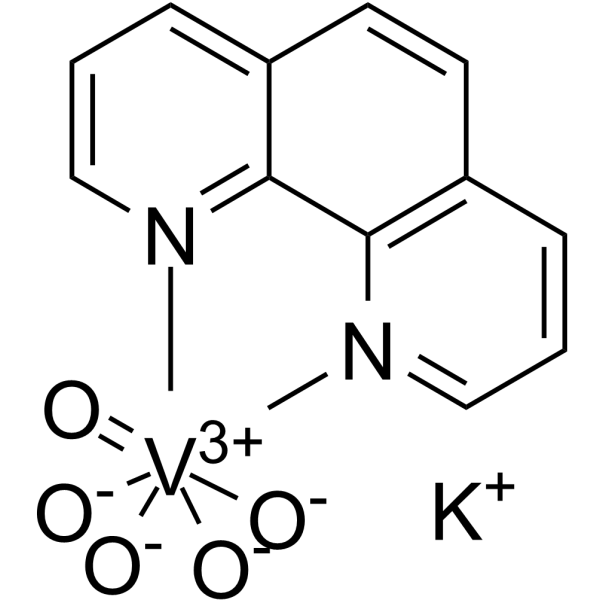
-
- HY-122818
-
|
|
PTEN
Phosphatase
Parasite
Apoptosis
|
Infection
Metabolic Disease
Inflammation/Immunology
Cancer
|
|
bpV(phen) trihydrate, a insulin-mimetic agent, is a potent protein tyrosine phosphatase (PTP) and PTEN inhibitor with IC50s of 38 nM, 343 nM and 920 nM for PTEN, PTP-β and PTP-1B, respectively. bpV(phen) trihydrate inhibits proliferation of the protozoan parasite Leishmania in vitro. bpV(phen) trihydrate strongly induces the secretion of a large number of chemokines and pro-inflammatory cytokines, and it activates a Th1-type pathway (IL-12, IFNγ). bpV(phen) trihydrate can also induce cell apoptosis, and has anti-angiogenic and anti-tumor activity [1] .
|
-
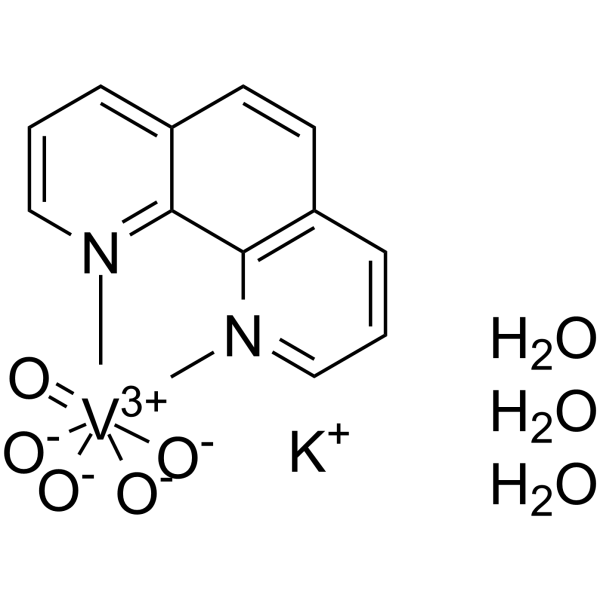
-
- HY-103637
-
|
VTP-43742
|
ROR
|
Inflammation/Immunology
|
|
Vimirogant (VTP-43742) is a potent, selective, and orally active RORγt inhibitor (Ki=3.5 nM; IC50=17 nM). Vimirogant exhibits >1000-fold selectivity versus the RORα and RORβ isotypes. Vimirogant inhibits Th17 differentiation and IL-17A secretion from mouse splenocytes (IC50=57 nM) without affecting Th1, Th2, or Treg cell differentiation. Vimirogant has the potential for autoimmune disorders research [1] .
|
-
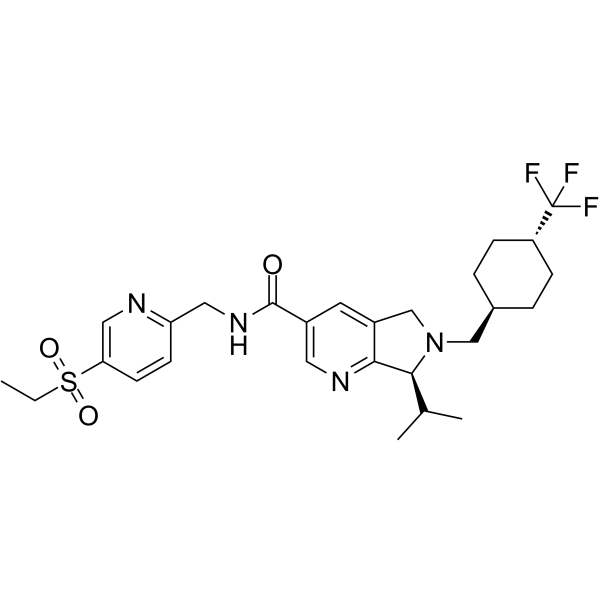
-
- HY-103637A
-
|
VTP-43742 hydrochloride
|
ROR
|
Inflammation/Immunology
|
|
Vimirogant (VTP-43742) hydrochloride is a potent, selective, and orally active RORγt inhibitor (Ki=3.5 nM; IC50=17 nM). Vimirogant hydrochloride exhibits >1000-fold selectivity versus the RORα and RORβ isotypes. Vimirogant hydrochloride inhibits Th17 differentiation and IL-17A secretion from mouse splenocytes (IC50=57 nM) without affecting Th1, Th2, or Treg cell differentiation. Vimirogant hydrochloride has the potential for autoimmune disorders research [1] .
|
-
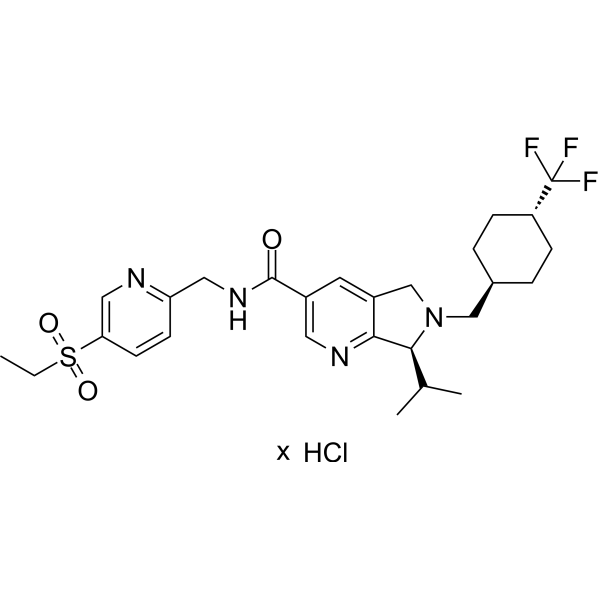
-
- HY-153808
-
|
|
Toll-like Receptor (TLR)
|
Inflammation/Immunology
|
|
Complete Freund's adjuvant (CFA) is an immunoadjuvant emulsified with antigen by its discoverer Jules T. Freund to enhance an animal's immune response to an antigen. Complete Freund's adjuvant (CFA) is also an inducer of the Th1 immune response and a ligand of TLRs. Complete Freund's adjuvant (CFA) contains heat-killed inactive tuberculosis bacilli and consists of a paraffin oil-in-water emulsion. Complete Freund's adjuvant (CFA) stimulates a strong and durable immune response and can be used to induce persistent inflammatory pain models in mice, experimental autoimmune myocarditis (EAM) models, and more. Incomplete Freund's adjuvant (IFA) (HY-153808A) is another type of Freund's Adjuvant that stimulates a weaker immune response [1] .
|
-

-
- HY-143885
-
|
|
JAK
|
Inflammation/Immunology
|
|
JAK1/TYK2-IN-3 is a potent, selective and orally active dual TYK2/JAK1 inhibitor with IC50 values of 6 and 37 nM, respectively. JAK1/TYK2-IN-3 also shows selectively relative to JAK2 (IC50=140 nM) and JAK3 (IC50=362 nM). JAK1/TYK2-IN-3 shows anti-inflammatory effect by regulating the expression of related TYK2/JAK1-regulated genes, as well as the formation of Th1, Th2, and Th17 cells [1].
|
-
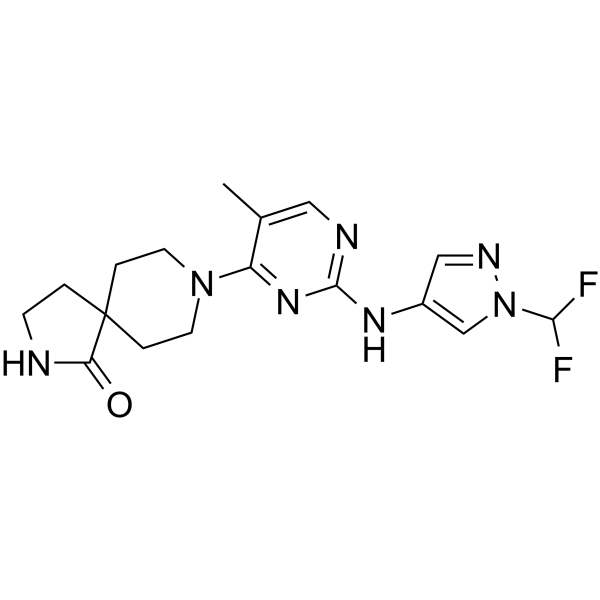
-
- HY-120628
-
|
|
Integrin
|
Inflammation/Immunology
|
|
BMS-587101 is a potent and orally active antagonist of leukocyte function associated antigen-1 (LFA-1). BMS-587101 has anti-inflammatory effects and can be used for rheumatoid arthritis research [1] .
|
-
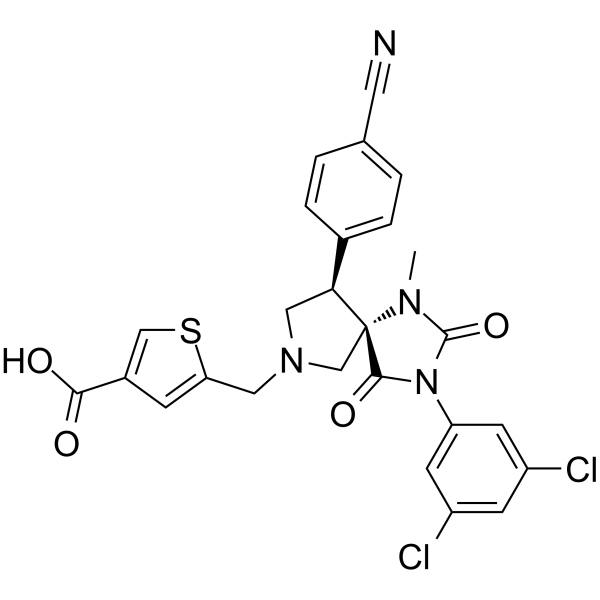
-
- HY-120137
-
|
|
Histone Methyltransferase
|
Cancer
|
|
CMP-5 is a potent, specific, and selective PRMT5 inhibitor, while displays no activity against PRMT1, PRMT4, and PRMT7 enzymes. CMP-5 selectively blocks S2Me-H4R3 by inhibiting PRMT5 methyltransferase activity on histone preparations. CMP-5 prevents Epstein-Barr virus (EBV)-driven B-lymphocyte transformation but leaving normal B cells unaffected [1] .
|
-
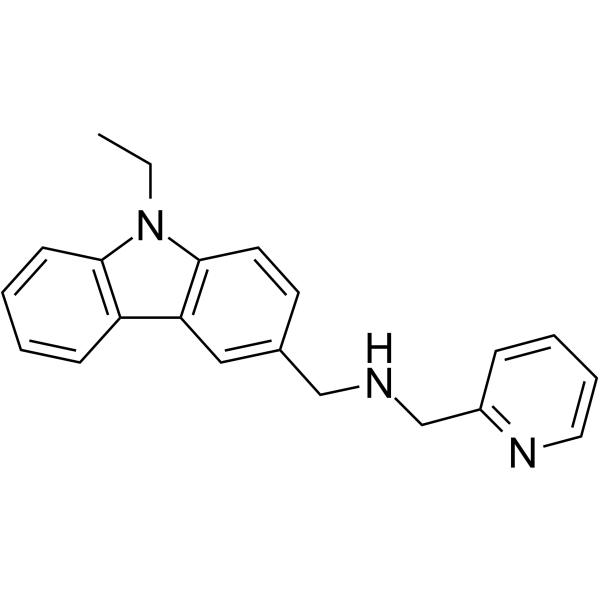
-
- HY-113846
-
|
|
Histone Methyltransferase
|
Cancer
|
|
CMP-5 hydrochloride is a potent, specific, and selective PRMT5 inhibitor, while displays no activity against PRMT1, PRMT4, and PRMT7 enzymes. CMP-5 hydrochloride selectively blocks S2Me-H4R3 by inhibiting PRMT5 methyltransferase activity on histone preparations. CMP-5 hydrochloride prevents EBV-driven B-lymphocyte transformation but leaving normal B cells unaffected [1] .
|
-
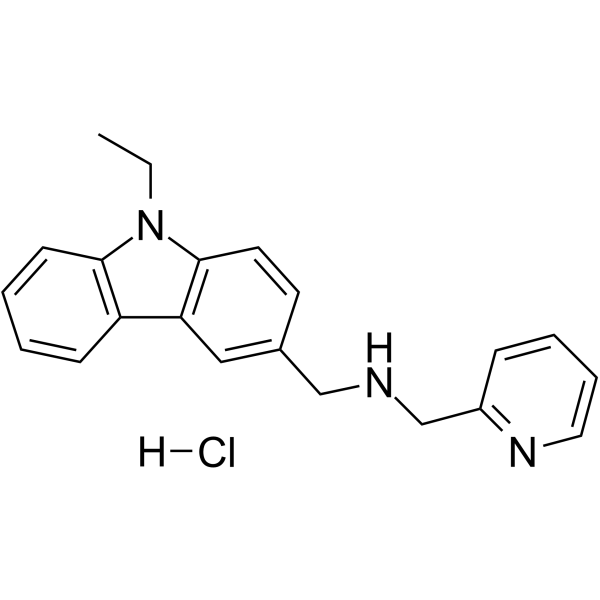
-
- HY-15648B
-
GSK-J4
Maximum Cited Publications
34 Publications Verification
|
Histone Demethylase
Apoptosis
|
Cancer
|
|
GSK-J4 is a potent dual inhibitor of H3K27me3/me2-demethylases JMJD3/KDM6B and UTX/KDM6A with IC50s of 8.6 and 6.6 μM, respectively. GSK-J4 inhibits LPS-induced TNF-α production in human primary macrophages with an IC50 of 9 μM. GSK J4 is a cell permeable proagent of GSK-J1 [1] . GSK-J4 induces endoplasmic reticulum stress-related apoptosis .
|
-
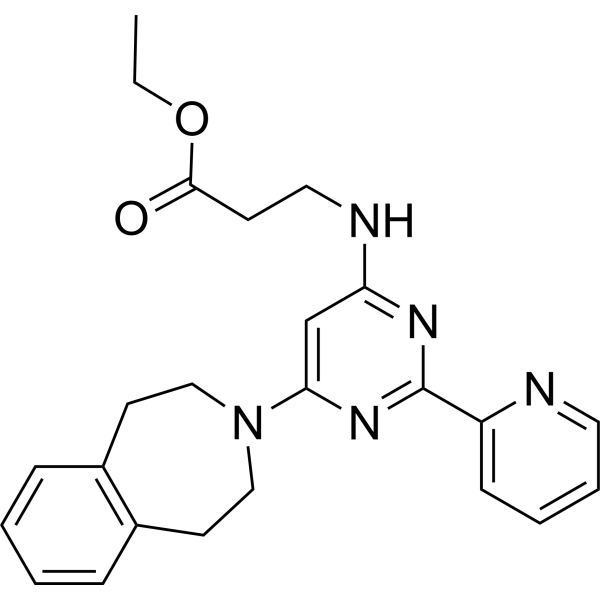
-
- HY-15648F
-
|
|
Histone Demethylase
|
Cancer
|
|
GSK-J4 hydrochloride is a potent dual inhibitor of H3K27me3/me2-demethylases JMJD3/KDM6B and UTX/KDM6A with IC50s of 8.6 and 6.6 μM, respectively. GSK-J4 hydrochloride inhibits LPS-induced TNF-α production in human primary macrophages with an IC50 of 9 μM. GSK-J4 hydrochloride is a cell permeable proagent of GSK-J1 [1] .
|
-
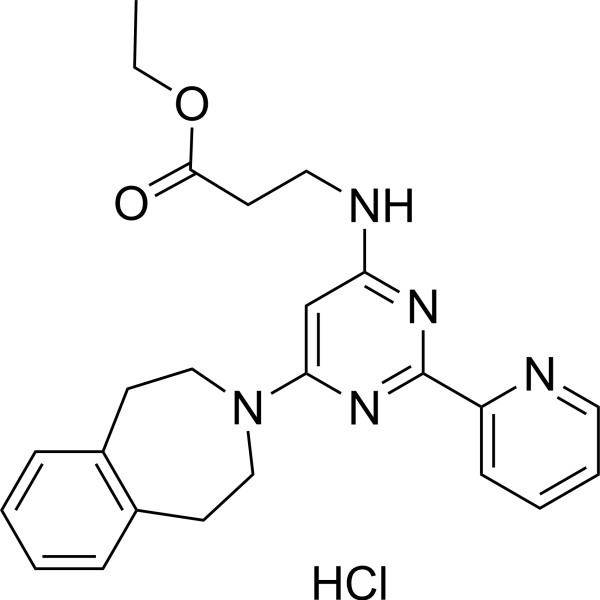
-
- HY-117985B
-
|
DA-1229 tartrate
|
Dipeptidyl Peptidase
Autophagy
|
Metabolic Disease
Inflammation/Immunology
|
|
Evogliptin (DA-1229) tartrate is an orally active DPP4 inhibitor with significant and sustained hypoglycaemic effects in mouse models. Evogliptin tartrate also inhibits the production of inflammatory and fibrotic signals in hepatocytes by inducing autophagy. Evogliptin tartrate can be used in studies of type 2 diabetes, osteoporosis, renal impairment and chronic liver inflammation [1] .
|
-
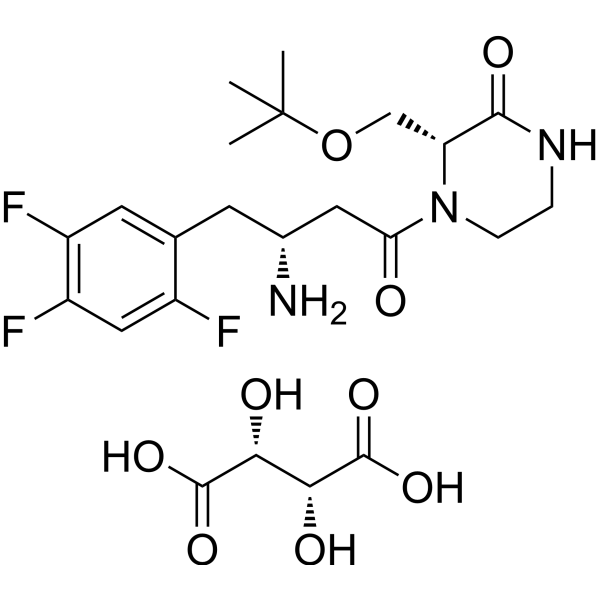
-
- HY-117985
-
|
DA-1229
|
Dipeptidyl Peptidase
Autophagy
|
Metabolic Disease
Inflammation/Immunology
|
|
Evogliptin (DA-1229) is an orally active DPP4 inhibitor with significant and sustained hypoglycaemic effects in mouse models. Evogliptin also inhibits the production of inflammatory and fibrotic signals in hepatocytes by inducing autophagy. Evogliptin can be used in studies of type 2 diabetes, osteoporosis, renal impairment and chronic liver inflammation [1] .
|
-
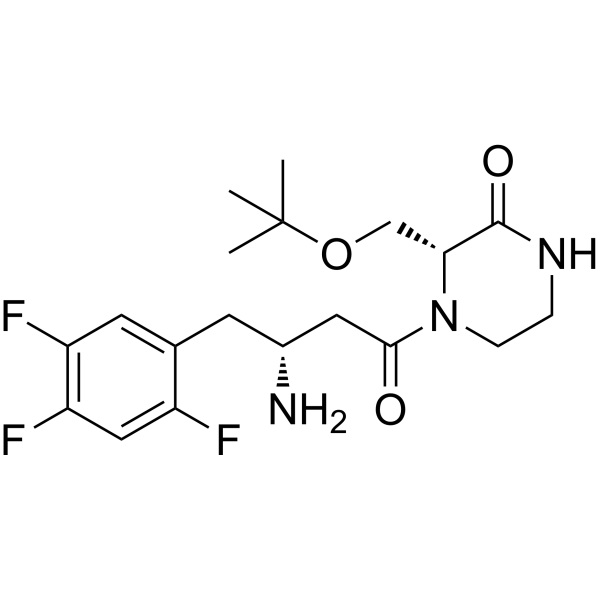
-
- HY-B1077
-
|
R-16341
|
Calcium Channel
Dopamine Receptor
Autophagy
Apoptosis
|
Neurological Disease
Inflammation/Immunology
Cancer
|
|
Penfluridol (R-16341) is a potent, long-acting, first-generation, oral diphenylbutylpiperidine antipsychotic agent by targeting D2-like dopamine receptor. Penfluridol effectively inhibits TNFα-induced NF-κB activation and alleviates the severity of arthritis and colitis in vivo. Penfluridol is a Ca 2+-calmodulin inhibitor. Penfluridol induces apoptosis and autophagy. Penfluridol is used for chronic schizophrenia, acute psychosis, Tourette syndrome and autoimmune diseases. Penfluridol inhibites the growth of E. faecalis planktonic cells with the MIC of 7.81 µg/ml [1] .
|
-
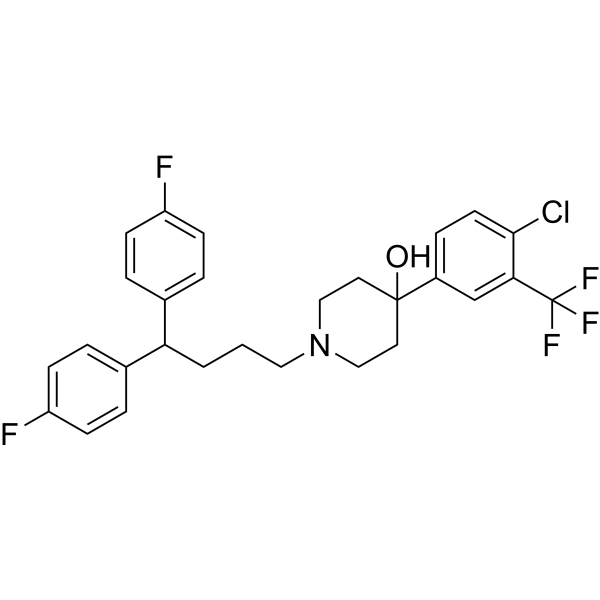
| Cat. No. |
Product Name |
Target |
Research Area |
-
- HY-P1052A
-
|
|
Peptides
|
Inflammation/Immunology
|
|
Myelin Basic Protein(87-99) TFA is an encephalitogenic peptide that induces basic protein-specific T cell proliferation. Myelin Basic Protein(87-99) TFA causes a Th1 polarization in peripheral blood mononuclear cells with is implicated of multiple sclerosis (MS) [1] .
|
-
- HY-P1240
-
|
MOG (35-55)
|
Peptides
|
Neurological Disease
Inflammation/Immunology
|
|
Myelin Oligodendrocyte Glycoprotein Peptide (35-55), mouse, rat (MOG (35-55)) is a minor component of CNS myelin. Myelin Oligodendrocyte Glycoprotein Peptide (35-55), mouse, rat has encephalitogenic activity and induces T cell proliferative. Myelin Oligodendrocyte Glycoprotein Peptide (35-55), mouse, rat induces Th1 cytokine response as well as relatively high levels of IgG antibodies. Myelin Oligodendrocyte Glycoprotein Peptide (35-55), mouse, rat produces a relapsing-remitting neurological disease with extensive plaque-like demyelination [1] .
|
-
- HY-P2507
-
|
|
Peptides
|
Cancer
|
|
NY-ESO-1 (87-111) is a pan-MHC class II-restricted peptide sequence. NY-ESO-1 (87-111) binds to multiple HLA-DR and HLA-DP4 molecules, and stimulates Th1-type and Th-2/Th0-type CD4 + T cells when presented in the context of HLA-DR and HLA-DP4 molecules [1].
|
-
- HY-P10109A
-
|
hG6PI (325-339) (hydrochloride)
|
Peptides
|
Inflammation/Immunology
|
|
G6PI 325-339 (human) hydrochloride is an efficient inducer of arthritis in B10.Q mice. G6PI 325-339 (human) hydrochloride primes Th1 and Th17 cells cross-reacted with the murine G6PI protein. G6PI 325-339 (human) hydrochloride induces arthritis model operating through a T and B cell-dependent pathway but without antibody effector mechanisms [1].
|
-
- HY-P10109
-
|
hG6PI (325-339)
|
Peptides
|
Inflammation/Immunology
|
|
G6PI 325-339 (human) is an efficient inducer of arthritis in B10.Q mice. G6PI 325-339 (human) primes Th1 and Th17 cells cross-reacted with the murine G6PI protein. G6PI 325-339 (human) induces arthritis model operating through a T and B cell-dependent pathway but without antibody effector mechanisms [1].
|
-
- HY-P1240B
-
|
MOG (35-55) (acetate)
|
Peptides
|
Neurological Disease
Inflammation/Immunology
|
|
Myelin Oligodendrocyte Glycoprotein Peptide (35-55), mouse, rat (MOG (35-55)) acetate is a minor component of CNS myelin. Myelin Oligodendrocyte Glycoprotein Peptide (35-55), mouse, rat acetate has encephalitogenic activity and induces T cell proliferative. Myelin Oligodendrocyte Glycoprotein Peptide (35-55), mouse, rat acetate induces Th1 cytokine response as well as relatively high levels of IgG antibodies. Myelin Oligodendrocyte Glycoprotein Peptide (35-55), mouse, rat acetate produces a relapsing-remitting neurological disease with extensive plaque-like demyelination [1] .
|
-
- HY-P1240A
-
|
MOG (35-55) (TFA)
|
Peptides
|
Neurological Disease
Inflammation/Immunology
|
|
Myelin Oligodendrocyte Glycoprotein Peptide (35-55), mouse, rat (MOG (35-55)) TFA is a minor component of CNS myelin. Myelin Oligodendrocyte Glycoprotein Peptide (35-55), mouse, rat TFA has encephalitogenic activity and induces T cell proliferative. Myelin Oligodendrocyte Glycoprotein Peptide (35-55), mouse, rat TFA induces Th1 cytokine response as well as relatively high levels of IgG antibodies. Myelin Oligodendrocyte Glycoprotein Peptide (35-55), mouse, rat TFA produces a relapsing-remitting neurological disease with extensive plaque-like demyelination [1] .
|
| Cat. No. |
Product Name |
Target |
Research Area |
-
- HY-P990034
-
|
MLTA3698A; RG7415; PRO283698
|
Inhibitory Antibodies
|
Inflammation/Immunology
|
|
Pateclizumab (MLTA3698A) is a humanized antibody against lymphotoxin α (LTα), a transiently expressed cytokine on activated B and T cells (Th1, Th17), which are implicated in rheumatoid arthritis (RA) pathogenesis [1].
|
-
- HY-P99396
-
|
BI 655130
|
Interleukin Related
|
Inflammation/Immunology
|
|
Spesolimab (BI 655130) is an anti-IL-36R antibody. IL-36 involves in immune system, as Spesolimab can be used for palmoplantar pustulosis (PPP) research. Spesolimab is associated with the reduction of biomarkers linked to innate, Th1/Th17, and neutrophilic pathways [1] .
|
| Cat. No. |
Product Name |
Category |
Target |
Chemical Structure |
Your information is safe with us. * Required Fields.
Inquiry Information
- Product Name:
- Cat. No.:
- Quantity:
- MCE Japan Authorized Agent:




































